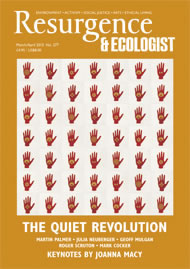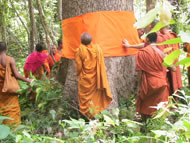I recently had to help a group of young people, mostly from the Occupy movement worldwide, think through how to hold a conference without falling into the usual trap at such events of meaningless language and posturing. We were particularly vexed by the issue of language and the now almost complete uselessness of terms such as ‘sustainable development’ or the deeply anthropocentric materialist term ‘ecosystem deliverables’.
So we came up with an idea. Many of you will know the BBC Radio programme Just a Minute, where people have to speak for one minute on a given subject without repetition, deviation or hesitation. So we agreed that this would be how we would run the conference. Nobody would be able to use the same term twice in any one talk, speech, report back to a plenary or any of the other usual things. The challenge of having to find other words to express ideas we no longer actually think about – such as the two cited above – would be fascinating to watch.
I mention this because to a very great extent the conservation/ecology world has created a language, even a mythology, that largely excludes people rather than including them. And this is a major reason why we are not as successful as we once thought we might be.
Amongst those we could be working with but have largely excluded are the world’s major faiths. Yet despite the fact that their perspectives, their land ownership and their influence have been ignored and not even seen as valid by the bulk of the conservation/ecology movements, they have quietly been getting on with protecting our living planet – so much so that they now constitute the largest environmental movements in the world.
Admission of the arrogance that leads to the exclusion of faith has been well expressed by Carl Pope, former executive director and chair of the Sierra Club – one of the largest conservation organisations in the US. He said: “I was part of the generation that made the choice – the horrendous strategic blunder – of situating ourselves outside the institutions of faith. Now we have a chance to repent of, and reform from, that error.”
Back in 1986, the Duke of Edinburgh, Prince Philip, who was at that time the International President of WWF, worked out that if the future was about changing hearts and minds then there were only two forces that have ever positively changed human society. These are the arts and religion – and in many cases the two were synonymous. This is why he initiated what the UN now calls “potentially the largest civil society movement in the world” – the involvement of the faiths in environmental action.
When the 1986 meeting took place in Assisi, Italy (the birthplace of St Francis), there was only one religious environmental programme in the world – the Buddhist Perception of Nature project working with Tibetan refugees and Thai monks and nuns. Today there are hundreds of thousands of religious environmental programmes in countries all around the world. Very few have ever had any link with the major environmental movements, and – perhaps more tellingly – very few have ever felt these movements had anything they needed. Quietly, at every level from small villages in Mexico to megacities such as Shanghai, the faiths have developed their own environmental movements, programmes and action.
This has built upon certain key aspects of the faiths.
First, their wisdom and their standing in communities. The faiths are the oldest human institutions and therefore the most ‘sustainable’. They know, from hundreds or thousands of years of guiding humanity, how to effect change in such a way as to carry people with them. The major faiths have perfected the appearance of being unchanging while subtly changing the whole time. Of course a few versions of every faith shout, threaten, try to scare or intimidate and make people feel guilty in order that they can push them to do what they want. But then so do many of the environmental movements. Conversely, the vast majority of faiths help people to make sense of their world and help them to become more compassionate within that understanding. Forget the nonsense about faith only being interested in the Next Life. Virtually every education system, health system, place of refuge has its roots in the work of the faiths over centuries, caring for, educating and helping the poorest of the poor.
Second, the faiths are trusted in ways that no government, international agency such as the UN, or NGO is. In most parts of the world, people will listen to their religious leaders first. Therefore, if you want to reach people it has to be in partnership with those they trust the most. I have seen so many environmental programmes cosy up to governments or – even worse – multinationals, only to be betrayed by them and for the scheme to be discredited in the eyes of the people. Think of the vain hopes placed at huge expense to almost every major environmental organisation in lobbying for and working with the national governments that went to the Copenhagen COP in 2009. Not only were they betrayed but they were actually evicted from the display hall.
Third, the faiths are involved in what one can best describe as the business of religion. They own outright about 8% of the habitable surface of the planet, and a further 15% or so is considered sacred (mountains, rivers, cities, pilgrimage routes) and therefore better protected than other areas. They run or are involved with around 50% of all schools (in Africa, according to UN figures, this rises to 64%), and these schools are usually the ones in the slums and in the rural areas. They have huge media networks, from newspapers through TV and radio to websites.
The faiths constitute 14% of the total capital market. They feed millions of people – for example, the Sikhs in India feed 30 million people every day. They are significant producers of goods from their farms and forests and they are significant purchasers. Which is why around the world they are now concentrating on the ecological management of these assets, from developing education programmes for their schools to creating tree nurseries (in Africa, the leading Christian, Muslim and Hindu traditions recently made the commitment to raise, plant and nurture over 70 million trees); from working with the Forest Stewardship Council on their forest holdings to developing environmental management for sacred sites (for example, the Green Pilgrimage Network is greening the Hajj and helped create China’s first green pilgrimage city at the Daoist sacred site of Louguan); from developing faith-consistent food purchasing programmes (for example, the Quakers in the UK) to faith-consistent investment programmes (such as Islamic banking in Indonesia).
But perhaps the most significant thing the conventional environmental movements can learn from this quiet revolution is the importance of celebration. So much of the standard way environmental issues are raised is about denial, giving up, stopping doing and about the ensuant guilt if you don’t. Don’t fly, don’t drive, don’t do this, don’t do that. And of course that has to be a part of the message. But the faiths have known for a very long time that fasting is important but you cannot ask people to fast all the time. This is why we have our Lent, or Ramadan, or Pansa. But then we party – Easter, Eid al-Fitr and Wesak, for example.
In a recent meeting about an environmental education toolkit for East Africa faith-based schools, the Alliance of Religions and Conservation team leader pointed out the difference between the standard environmental education toolkit and this new faith-based one. “The usual one starts with telling the children how dreadful everything is and what has gone wrong. Our one – for Muslim and Christian schools – starts by saying thank you to God for creating such a fabulous, beautiful, complex and exciting world. Only then do we turn to our responsibilities and the problems that have come to trouble this wonderful world, knowing we are not alone.”
Because, if we do not celebrate, why should we want to bother at all?








